Welcome back to This Week in Apps, the weekly TechCrunch series that recaps the latest in mobile OS news, mobile applications and the overall app economy.
The app industry is as hot as ever, with a record 218 billion downloads and $143 billion in global consumer spend in 2020.
Consumers last year also spent 3.5 trillion minutes using apps on Android devices alone. And in the U.S., app usage surged ahead of the time spent watching live TV. Currently, the average American watches 3.7 hours of live TV per day, but now spends four hours per day on their mobile devices.
Apps aren’t just a way to pass idle hours — they’re also a big business. In 2019, mobile-first companies had a combined $544 billion valuation, 6.5x higher than those without a mobile focus. In 2020, investors poured $73 billion in capital into mobile companies — a figure that’s up 27% year-over-year.
This week, there was a lot of headline-making app ecosystem news, including Google’s impactful decision to drop its Play Store commissions, an App Store lawsuit over scammy apps with fake ratings, battles over Apple’s App Tracking Transparency and the arrival of a notable new feature on YouTube — a TikTok rival called Shorts.
This Week in Apps will soon be a newsletter! Sign up here: techcrunch.com/newsletters
Top Stories
Developer sues Apple over lost revenue due to App Store scams
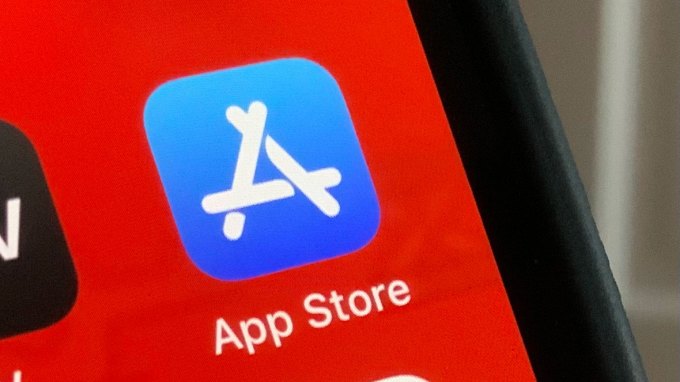
Image Credits: TechCrunch
Kosta Eleftheriou, a co-founder of the Fleksy keyboard app, has been raising awareness about App Store scams in recent weeks, after his own app was targeted by copycat subscription scammers leveraging fake ratings and reviews to gain traction. This week, Eleftheriou filed a lawsuit that attempts to hold Apple accountable for his own app’s lost revenue, saying that Apple promises developers a safe and trustworthy marketplace, but then allows these scammers to operate to the detriment of legitimate apps like his own. Though some news articles positioned the case as some sort of antitrust lawsuit, it’s really more focused on scammers and the accountability Apple has for how its App Store operates, which apps are listed and how well it’s managed and policed. Eleftheriou is asking Apple to compensate him for his lost revenue and other damages as a result of Apple’s ill-run app marketplace, as well as what he claims are unfair App Review rejections.
Google Play drops commissions to 15% on some earnings
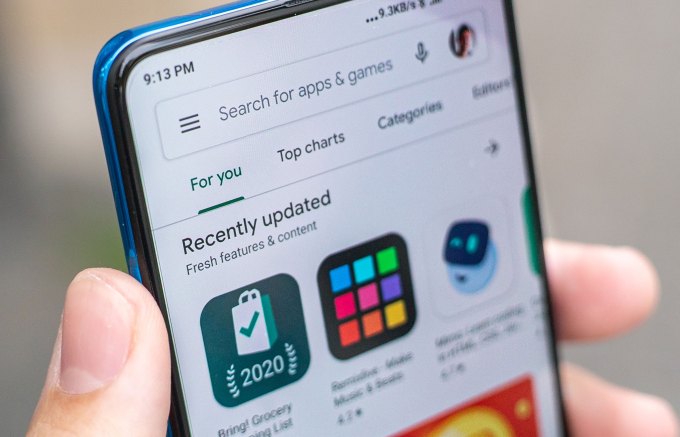
Google Play Store screen
Google has followed Apple’s lead in reducing commissions for the Google Play store. But in its case, it has dropped commissions from 30% to 15% on developers’ first $1 million in revenue. Apple, by comparison, starts charging 30% once the developer tops $1 million. Google said 99% of developers who sell goods and services through the Play Store will see a 50% reduction in fees. According to App Annie data, very few Google Play developers make more than $1 million — in fact, only 2,035 developers do on Google Play, compared with 3,611 on iOS. To put this in perspective in terms of revenue, developers making up to $1 million in consumer spend only comprised 5% of total Google Play consumer spend in 2020, the firm noted.
Apple’s ATT scores a win in France
Apple fended off an attempt by advertisers in France who wanted to derail the IDFA change in iOS, which will require users’ permission in order to track them. The complaint had attempted to contrast Apple’s ATT (App Tracking Transparency) requirements for third parties with Apple’s own, where its first-party apps are allow to track by default for the purpose of personalizing ads in various Apple apps. France’s competition regulator decided Apple’s plans “don’t appear to be abusive” and said it can’t intervene just because some apps may see a negative impact. But the authority did say it will investigate Apple further to determine if any of its changes are “self-preferencing.”
YouTube launches its TikTok rival in the U.S.
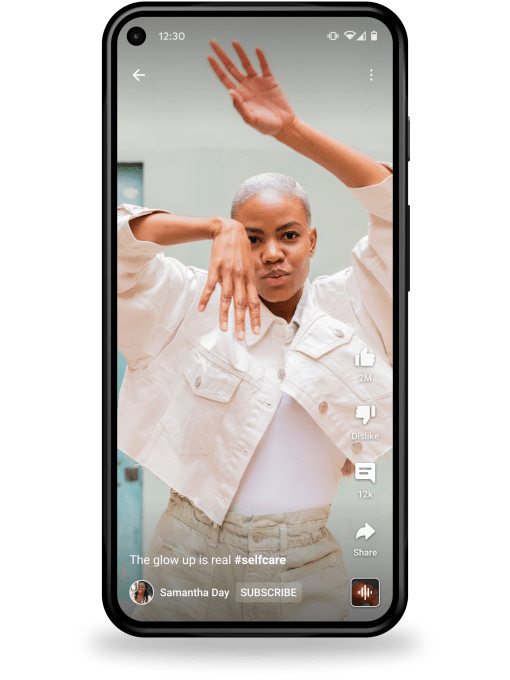
Image Credits: YouTube
The short-form video experience known as YouTube Shorts first launched in India, where TikTok has been banned, in September. It’s now coming to the U.S. in its first major expansion. The feature, still in beta, offers a very TikTok-like experience both in terms of recording content and viewing. Users can tap to record video segments for up to 60-second long videos, and use a small handful of editing features like text captions, countdown timers and speed controls. Meanwhile, viewing the videos is also presented in a TikTok-like format with vertical feeds of video where you can double-tap to like, duck into comments or tap on hashtags or sounds to participate in trends.
YouTube believes the feature has potential because it’s connected to the larger YouTube ecosystem, including YouTube Music and the main platform itself — you can subscribe to YouTube channels right from Shorts, for example. But Shorts lacks a lot of what makes TikTok successful for the time being, like its numerous AR effects and editing tools, sound sync and its ability for creators to react and respond to other videos through stitches and duets.
Weekly News
Platforms: Apple
Apple will allow the Russian government to pre-install apps on the iPhone starting on April 1, 2021. In accordance with a new law, Apple users will be shown a dialog box at setup that prompts them to install web browsers, antivirus, messenger and email apps. Users can choose to deselect these apps or delete them from the device later.
Report claims Apple may soon deliver standalone iOS security updates. According to code found in the latest iOS 14.5 beta, Apple could be preparing to introduce a way to update older iPhones with critical security updates without requiring users to download new versions of iOS. This could be helpful in patching older devices where users don’t download iOS updates for fear of slowing down their phone.
Apple says the App Store now supports 300K jobs in the U.K., up 10% YoY, as well as 250K jobs in Germany and another 250K in France. The figures were released in response to increased antitrust scrutiny by regulators, as a way to demonstrate the App Store’s contribution to local economies.
Platforms: Google
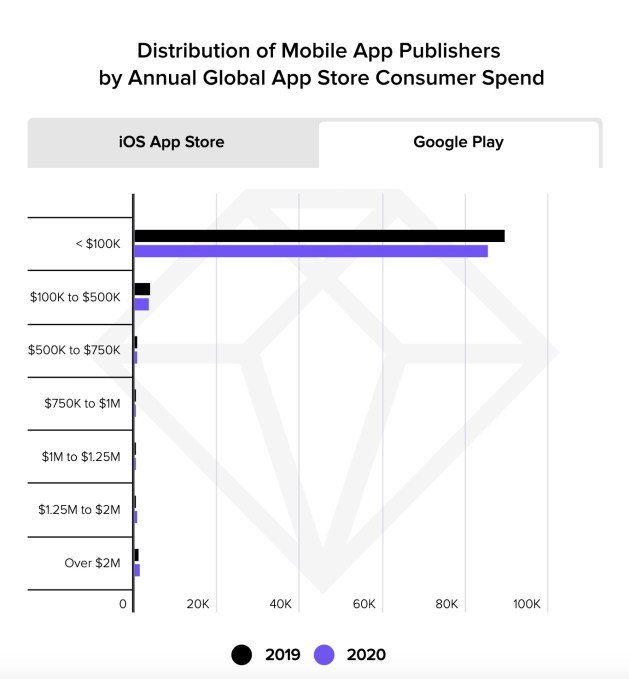
Image Credits: App Annie
App Annie data shows how few Google Play developers will pay the higher 30% commission after the policy change, announced this week. Google says developers’ first $1 million in revenue will be commissioned at 15%, not 30%. This covers the vast majority of the Play Store’s developer base, as only 2,035 developers make $1 million or more.
Google updates its People API, which will replace the Contacts API being deprecated on June 15, 2021. The new API will now support two new endpoints for batch mutates and Contacts searches, the company said.
Google updates its parental controls for Android, Family Link. The updates acknowledge that not all screen time is the same, by allowing parents to set some apps — like those used for virtual school — as “always allowed” and not counting toward daily limits. It also updated reporting to better show where kids were spending time outside of these necessary apps.
Google is now allowing third-party developers to build Tiles for Wear OS smartwatches. Tiles are small, fast-loading experiences that can deliver specific, timely information users need, but can be tapped to open a related app on the watch or phone for a deeper experience.
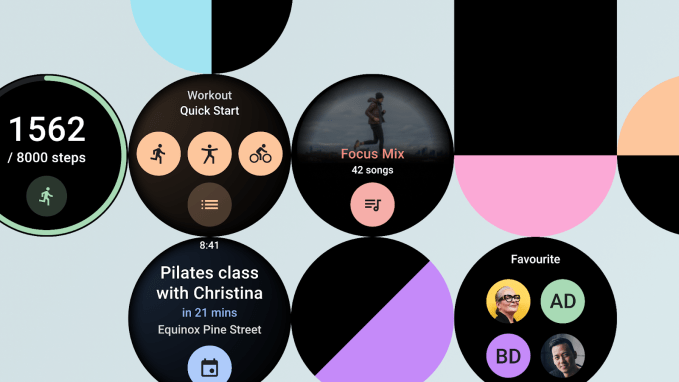
Image Credits: Google
E-commerce
Facebook’s Mark Zuckerberg said his company has been preparing for the Apple IDFA changes by investing in more commerce products on its own platforms, like Facebook and Instagram Shops. In a Clubhouse session on Thursday, he announced Facebook has 1 million active Shops which are used by 250 million people every month.
Social
Twitter is testing a way for users to watch YouTube videos from within the home timeline directly on iOS devices, instead of being redirected to YouTube. Finally! The test was made possible through YouTube’s iFrame Player API, which Twitter gained access to.
TikTok will no longer allow users to opt out of personalized advertising starting on April 15th. The app alerted users to the change via a notice that appeared on screen at launch. This means uses will see ads based on what they watch and engage with on TikTok.
TikTok may add a group chats feature sometime early this year, according to Reuters. The feature is already a part of the Chinese version of the TikTok app, Douyin, and would make the app more social.
Instagram adds new teen safety tools as competition with TikTok heats up. TikTok has been making its app safer for teens and this week Instagram followed suit — but instead of locking down teens accounts by default, it made it more difficult for adult predators to reach teens on Instagram, through a variety of alerts and blocking features.
Leaked recordings detail conservative donor Rebekah Mercer’s role at right-wing social app Parler, where she joined meetings to rally employees to fight against the shut down of free speech, and other matters, Bloomberg reports.
Facebook is preparing to add an age-gate to Instagram that would allow for a curated, and likely COPPA-compliant, under 13 experience, according to a report from BuzzFeed. TikTok today does the same thing, following its FTC fines. Instagram could be doing the same to ward off any FTC investigation into underage use of its app as well as to better cater to the younger users who are already on Instagram today.
Messaging
China banned Signal. The encrypted messaging app became unavailable on the mainland on March 16, following a ban of the Signal website the day prior. The app had been one of the few Western social networks that was accessible in China without a VPN.
Telegram is working on an audio experience that allows users to create voice chats in Telegram Channels that you can join either with your personal profile or channel profile. The feature is in beta testing and no official announcement has been made.
Streaming & Entertainment
Clubhouse hires Instagram alum Fadia Kader as its new head of Media Partnerships and Creators. The hire follows that of OWN and Netflix alum Maya Watson to serve as head of Global Marketing, and points to an increased interest in establishing Clubhouse in the world of media. Kader’s background is in music and tech, having led music partnerships at Twitter, and having worked at Def Jam.
Clubhouse promises its accelerator participants either brand deals or $5,000 per month during its three-month program. The company plans to work with around 20 creators to help them produce, book guests and promote their shows on the platform, as well as source brand deals.
Clubhouse is also currently being investigated by France’s privacy watchdog, CNIL, in an attempt to determine whether or not GDPR will apply to the app and how it’s complying with EU rules. Germany’s regulator last month was doing something similar, as it began looking into how the app was protecting the privacy of European users and their contacts.
Premium content, entertainment and streaming have helped drive up the prices of in-app purchases (IAPs). In 2020, the median price for IAPs among the top non-game apps was $5.99, up from $3.99 in 2017. The median price of subscription IAPs alone, meanwhile, has remained flat at $9.99 over the past four years, Sensor Tower found.
AT&T will begin counting HBO Max streams through the app against data limits. The company owns HBO via WarnerMedia and was previously exempting streams from data caps, but says a California net neutrality law will now no longer allow it to do so. AT&T spoke out against a patchwork of state regulations for net neutrality, saying they will create roadblocks to pro-consumer solutions.
Gaming
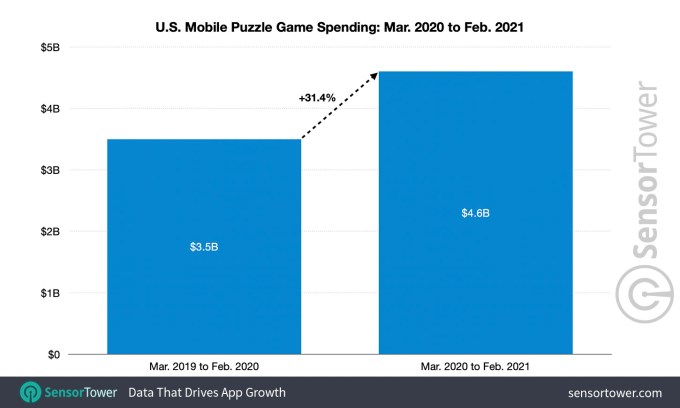
Image Credits: Sensor Tower
U.S. mobile puzzle game spending jumped 30% YoY to $4.6 billion in 2020, per a Sensor Tower report. The pandemic likely contributed to the rise, with top game Candy Crush Saga pulling in $643 million following by Homescapes and Gardenscapes.
Health & Fitness
Apple Maps has been updated with COVID-19 vaccine locations in the U.S. Apple is sourcing data from VaccineFinder, an initiative led by Boston Children’s Hospital, which is also one of the sources Google Maps is using. Apple is allowing healthcare providers, labs and other businesses to submit their information about vaccine locations.
Facebook will label all COVID-19 vaccine posts with a pointer to official, authoritative sources of information across Facebook and Instagram. It also said it will reduce the distribution of content from users who repeatedly violated policies on vaccine misinformation or who shared debunked claims, as well as any claims that fact checkers say are “Missing Context.”
Security & Privacy
Facebook expands support for security keys to mobile users on iOS and Android. The social network has supported the use of security keys, which generate encrypted, one-time security codes, for desktop users since 2017.
California passed new regulations that ban so-called “dark patterns,” or designs used by websites and apps to frustrate or trick users into doing things they wouldn’t normally do — like subscribing to a service they didn’t want or opting-in to sharing their data with the company, for example.
An iPhone app privacy report from cloud storage company pCloud showed how much personal data is being accessed by apps. The apps collecting the most data were Facebook and Instagram, while Klarna and Grubhub tied for second place, followed by Uber and Uber Eats.
Big tech, including Apple and Google, are ramping up their lobbying in U.S. state capitals, reports The WSJ, as a number of bills that could regulate their industries are arriving in state legislatures. One of these is an app store payments bill that is going to be debated in Arizona’s Senate in the next several weeks. If passed, developers would be able to use their own payment systems for in-app purchases instead of Apple’s and Google’s systems. Other legislation is being proposed in states including Maryland and Virginia.
A government-backed consortium of Chinese companies introduced a new method for tracking iPhone users as an alternative to IDFA (paywalled source: FT). The system could be a workaround for Apple’s App Tracking Transparency, as it won’t require user permission. Tencent and ByteDance are reportedly testing the system, known as CAID.
Google finally rolls out iOS privacy labels for Chrome and Google Search. Competitor DuckDuckGo trolled the company for its delay, saying “after months of stalling, Google finally revealed how much personal data they collect in Chrome and the Google app. No wonder they wanted to hide it.” Burn!
Business, Enterprise and Productivity
App Annie partners with Snowflake and introduces a new Salesforce integration. The former allow data teams to access and transform a variety of mobile estimates, both live and continually updated. The new App Annie Intelligence Salesforce Connector, meanwhile, lets App Annie customers build a better pipeline through mobile-metric enriched CRM records.
Google Meet rolls out the tile view on iOS, to be soon followed by Android support. This view allows a user to see more of the people on the video call, even on the small screen. The app also introduced support for live captions in four new languages on mobile (French, German, Portuguese and Spanish, the latter for Spain and Latin America)
Funding and M&A
 Snap acquired a Berlin-based clothing size recommendation engine Fit Analytics that helps online shoppers buy the right sized clothes. Deal terms were undisclosed. The acquisition will see over 100 Fit team members joining Snap as the company pushes into e-commerce.
Snap acquired a Berlin-based clothing size recommendation engine Fit Analytics that helps online shoppers buy the right sized clothes. Deal terms were undisclosed. The acquisition will see over 100 Fit team members joining Snap as the company pushes into e-commerce.
 Riva Health raised $15.5 million in seed (!!) funding to turn your smartphone into a blood pressure monitor, in a round led by Menlo Ventures. The company is co-founded by scientist Tuhin Sinha and Siri and Viv (exited to Samsung) co-founder Dag Kittlaus. The system being developed would have users place their finger over the phone’s camera light, which would then flash, allowing the app to use the light to track the blood pressure reading.
Riva Health raised $15.5 million in seed (!!) funding to turn your smartphone into a blood pressure monitor, in a round led by Menlo Ventures. The company is co-founded by scientist Tuhin Sinha and Siri and Viv (exited to Samsung) co-founder Dag Kittlaus. The system being developed would have users place their finger over the phone’s camera light, which would then flash, allowing the app to use the light to track the blood pressure reading.
 Mobile banking app Kuda raised $25 million led by Valar to become the neobank for all of Africa. The company today offers mobile-first banking services in Nigeria and has doubled its user base from its seed round to now 650,000.
Mobile banking app Kuda raised $25 million led by Valar to become the neobank for all of Africa. The company today offers mobile-first banking services in Nigeria and has doubled its user base from its seed round to now 650,000.
 London-based mobile investing app Invstr raised $20 million to pair Robinhood-like commission-free stock trades with digital banking services and educational and learning tools. The app has over 1 million global users.
London-based mobile investing app Invstr raised $20 million to pair Robinhood-like commission-free stock trades with digital banking services and educational and learning tools. The app has over 1 million global users.
 Investing app Gatsby raised a $10 million Series A for its Robinhood competitor. The app is aimed at younger users, offering commission-free options and stock trading and is aiming to have more than 100K accounts by the end of the year.
Investing app Gatsby raised a $10 million Series A for its Robinhood competitor. The app is aimed at younger users, offering commission-free options and stock trading and is aiming to have more than 100K accounts by the end of the year.
 Digitail’s app for veterinary surgery practices raised $2.5 million in seed funding, in a round led by byFounders and Gradient Ventures (Google’s AI fund). The company currently has 2,000 vets in 16 countries using its services.
Digitail’s app for veterinary surgery practices raised $2.5 million in seed funding, in a round led by byFounders and Gradient Ventures (Google’s AI fund). The company currently has 2,000 vets in 16 countries using its services.
 Match Group makes a seven-figure investment in background check nonprofit Garbo. The Tinder parent company plans to integrate its apps with Garbo’s tools, which alert users to background checks of concern to daters like assault or stalking charges, among other things.
Match Group makes a seven-figure investment in background check nonprofit Garbo. The Tinder parent company plans to integrate its apps with Garbo’s tools, which alert users to background checks of concern to daters like assault or stalking charges, among other things.
 Telegram is selling more than $1 billion in debt to investors to fund its operations and pay creditors, with the promises of discounted equity if the company later goes public. The messaging app owes its creditors around $700m by the end of April, The WSJ reported.
Telegram is selling more than $1 billion in debt to investors to fund its operations and pay creditors, with the promises of discounted equity if the company later goes public. The messaging app owes its creditors around $700m by the end of April, The WSJ reported.
Downloads
Swell
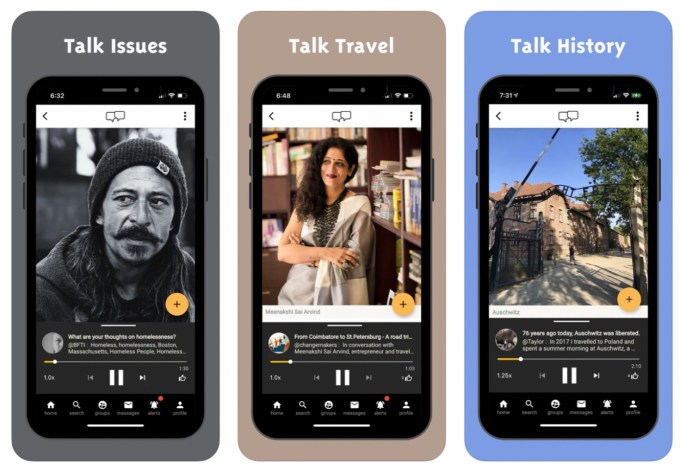
Image Credits: Swell
A new startup called Swell has a different take on voice conversations than Clubhouse. Instead of real-time conversations, Swell users engage in asynchronous chats where one user posts an audio clip of up to five minutes in length that others can listen to and then respond to with their own recording. These mini-podcasts can be private chats or public conversations. Swell is available as a free download on both iOS and Android.
1v1Me
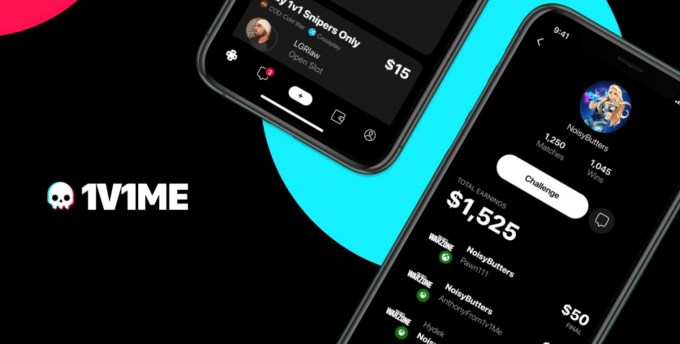
Image Credits: 1v1Me (opens in a new window)
1v1Me launches its app that lets anyone gamble on their ability to win in a player versus player game. The iOS app is now available in an invite-only mode, with the first invites going to creators who play games like Call of Duty and Fortnite — the first games that will be supported on the betting platform. Users can sign up for early access on the company’s website for the time being, then stalk the company on Twitter for invites.
Half Lemons
This clever iOS recipes app, Half Lemons, does that thing you’ve always wanted a recipe app to do: it serves up dish ideas using the ingredients you have at home. To use the app, you take a quick digital inventory of your kitchen in order to customize the app to deliver recipes that are specifically tailored to your own ingredients. You can then save or share the recipes, in addition to making them right away with a screen that stays powered on as you cook. Future versions of the app will help you shop for ingredients and plan meals.
Retrofy your iPhone
Image Credits: Ben Vessey (opens in a new window)
Bored with your iOS 14 customizations? Take your iPhone old-school with this super retro iOS 14 icon and wallpaper set featuring over 110 Mac OS ’84 icons and six monochromatic wallpapers. The set has been handcrafted by freelance digital product designer Ben Vessey, who many years ago had created a similar theme for “retrofying” your desktop screen. When he heard about the Shortcuts feature in iOS 14, he got to work to build a version of this retro experience for iPhone. The pack is £3.99, or £79.99 if you want to request five custom icons of your choice in addition.
Powered by WPeMatico








